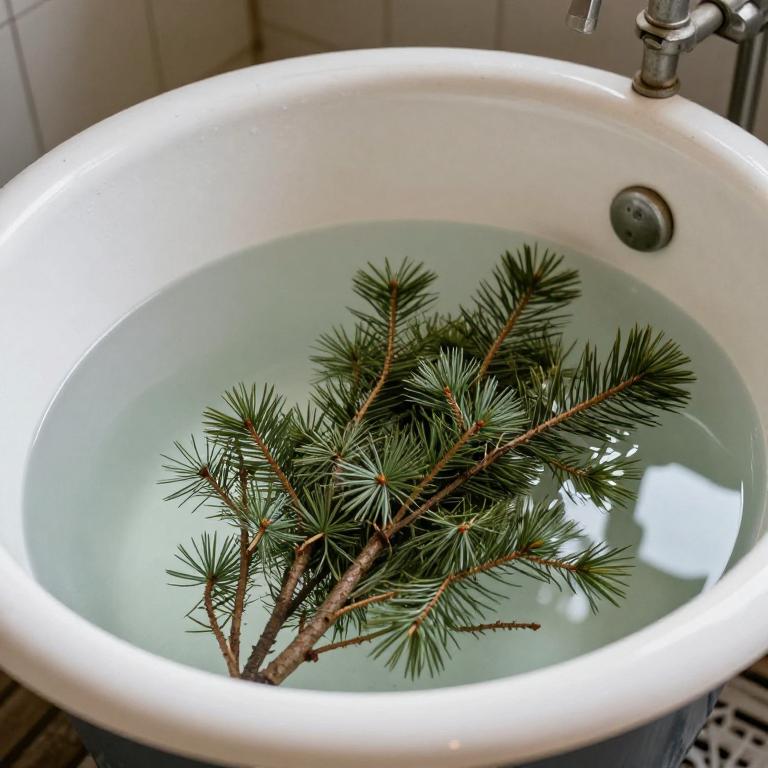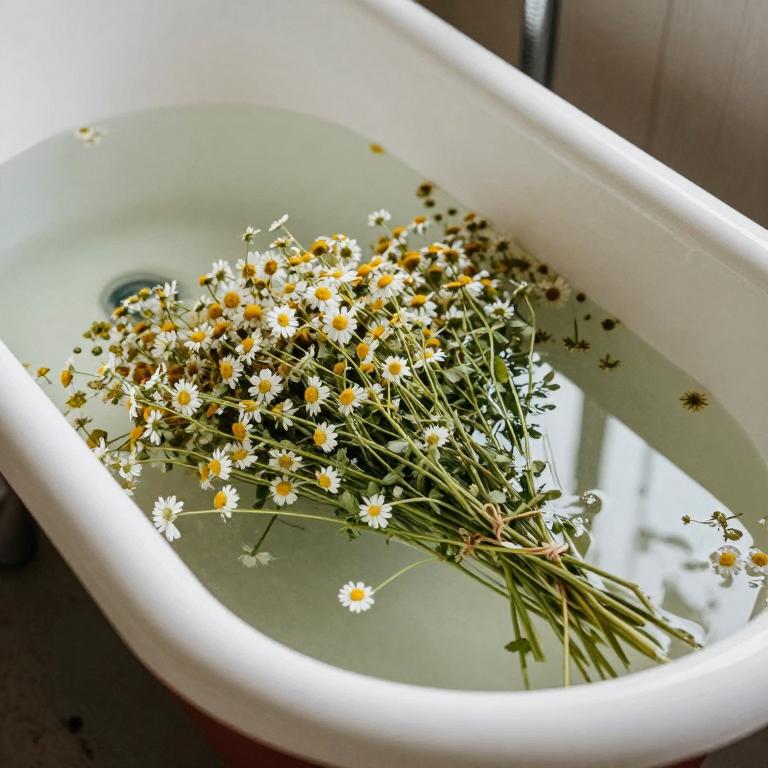10 Best Herbal Baths For Acute Bronchitis

Herbal baths can be a soothing and natural remedy for individuals suffering from acute bronchitis, offering relief through the inhalation of steam infused with medicinal herbs.
Certain herbs such as eucalyptus, lavender, and thyme are known for their anti-inflammatory and decongestant properties, which can help ease breathing and reduce coughing. To prepare an herbal bath, these dried or fresh herbs can be placed in a heat-safe container and added to warm water, allowing the steam to carry their therapeutic compounds into the air. The warmth of the bath also helps to relax the muscles and ease the overall discomfort associated with bronchitis.
While herbal baths are not a substitute for medical treatment, they can complement conventional care by providing symptomatic relief and promoting relaxation.
Table of Contents
- 1. Eucalyptus (Eucalyptus globulus)
- 2. Peppermint (Mentha piperita)
- 3. Thyme (Thymus vulgaris)
- 4. Salvia (Salvia officinalis)
- 5. Rosemary (Rosmarinus officinalis)
- 6. Scots pine (Pinus sylvestris)
- 7. Stinging nettle (Urtica dioica)
- 8. English lavender (Lavandula angustifolia)
- 9. Ginger (Zingiber officinale)
- 10. Chamomile (Matricaria chamomilla)
1. Eucalyptus (Eucalyptus globulus)

Eucalyptus globulus, commonly known as blue gum eucalyptus, is often used in herbal baths to alleviate symptoms of acute bronchitis due to its potent anti-inflammatory and decongestant properties.
When added to warm water, the essential oils from eucalyptus globulus release aromatic compounds that can help ease respiratory congestion and promote easier breathing. A soothing herbal bath can also help reduce fever and soothe sore muscles, which are common during episodes of bronchitis. However, it is important to note that while such baths may provide symptomatic relief, they should not replace medical treatment for acute bronchitis.
Always consult a healthcare professional before using herbal remedies, especially if symptoms persist or worsen.
2. Peppermint (Mentha piperita)

Mentha piperita, commonly known as peppermint, has been traditionally used in herbal baths to alleviate symptoms of acute bronchitis.
The aromatic compounds in peppermint, such as menthol, can help soothe respiratory congestion and ease breathing when used in a warm bath. Soaking in a peppermint-infused bath promotes relaxation and may reduce inflammation in the airways. This natural remedy is often recommended for its ability to provide relief from coughing and chest tightness.
However, it should be used with caution, especially for individuals with sensitive skin or respiratory conditions, and should not replace professional medical treatment.
3. Thyme (Thymus vulgaris)

Thymus vulgaris, commonly known as thyme, has been traditionally used in herbal baths to support respiratory health, including in cases of acute bronchitis.
The essential oils and phytochemicals present in thyme possess antimicrobial, anti-inflammatory, and bronchodilator properties that may help alleviate symptoms such as coughing and congestion. When used in a warm herbal bath, thyme can promote relaxation and ease breathing by reducing mucus buildup and soothing irritated airways. However, it is important to dilute thyme essential oil properly to avoid skin irritation, and individuals with sensitive skin or allergies should exercise caution.
While herbal baths can be a complementary therapy, they should not replace conventional medical treatment for acute bronchitis, and consultation with a healthcare professional is recommended.
4. Salvia (Salvia officinalis)

Salvia officinalis, commonly known as sage, has been traditionally used in herbal baths to support respiratory health, including in cases of acute bronchitis.
The antibacterial and anti-inflammatory properties of sage may help reduce mucus production and soothe irritated airways when used in a warm bath. To prepare a sage herbal bath, a handful of dried sage leaves can be steeped in hot water and then added to a tub of warm water. This method allows the steam from the infused water to provide aromatic inhalation benefits, which can ease breathing and reduce coughing.
While herbal baths are not a substitute for medical treatment, they may offer complementary relief for symptoms associated with acute bronchitis.
5. Rosemary (Rosmarinus officinalis)

Rosmarinus officinalis, commonly known as rosemary, is often used in herbal baths to support respiratory health, including in cases of acute bronchitis.
The essential oils derived from rosemary leaves contain compounds like cineole and camphor, which have mild anti-inflammatory and expectorant properties that may help ease bronchial congestion. When added to warm water for a bath, these oils can promote relaxation and improve circulation, potentially aiding in the body's recovery process. However, it is important to note that while rosemary baths may offer comfort and support, they should not replace medical treatment for acute bronchitis.
Always consult a healthcare professional for proper diagnosis and treatment recommendations.
6. Scots pine (Pinus sylvestris)

Pinus sylvestris, commonly known as Scots pine, has been traditionally used in herbal baths for its soothing and respiratory benefits.
The essential oils derived from the needles of this pine species contain compounds like alpha-pinene and beta-pinene, which possess anti-inflammatory and antimicrobial properties. These properties may help alleviate symptoms of acute bronchitis by reducing inflammation in the airways and supporting respiratory function. Incorporating a pine-infused herbal bath can promote relaxation and ease breathing, offering a complementary approach to conventional treatments.
However, it is important to consult with a healthcare professional before using such remedies, especially for individuals with existing respiratory conditions or allergies.
7. Stinging nettle (Urtica dioica)

Urtica dioica, commonly known as stinging nettle, has been traditionally used in herbal baths to support respiratory health.
When used in a bath, the compounds in stinging nettle may help reduce inflammation and soothe the airways, potentially offering relief for symptoms of acute bronchitis. The anti-inflammatory and antioxidant properties of nettle are believed to support the body's natural healing processes. Herbal baths with Urtica dioica can be a complementary therapy, often used alongside conventional treatments.
However, it is important to consult with a healthcare provider before using nettle baths, especially for individuals with sensitive skin or existing medical conditions.
8. English lavender (Lavandula angustifolia)

Lavandula angustifolia, commonly known as narrow-leaf lavender, has been traditionally used in herbal baths for its calming and anti-inflammatory properties.
When infused into bath water, lavender essential oil can help soothe respiratory discomfort associated with acute bronchitis by reducing inflammation in the airways. The aromatic compounds in lavender may also promote relaxation, easing the stress that often accompanies respiratory illnesses. Additionally, the warm water of the bath can help loosen mucus and ease breathing, providing symptomatic relief.
While herbal baths should not replace medical treatment, they can serve as a complementary therapy to support overall comfort and recovery during an episode of acute bronchitis.
9. Ginger (Zingiber officinale)

Zingiber officinale, commonly known as ginger, has been traditionally used in herbal baths to alleviate symptoms of acute bronchitis due to its anti-inflammatory and bronchodilatory properties.
When infused into bath water, ginger can help reduce inflammation in the airways, ease coughing, and promote relaxation, which may support respiratory function. The warm, aromatic steam from a ginger bath can help open up the bronchial passages, making it easier to breathe and reducing congestion. Additionally, the therapeutic heat of the bath can soothe muscle tension and enhance overall comfort during recovery.
While herbal baths can be a complementary therapy, they should not replace medical treatment for acute bronchitis, and individuals with severe symptoms should seek professional medical advice.
10. Chamomile (Matricaria chamomilla)

Matricaria chamomilla, commonly known as chamomile, has been traditionally used in herbal baths to support respiratory health, including in cases of acute bronchitis.
The anti-inflammatory and soothing properties of chamomile may help reduce inflammation in the airways and ease coughing associated with bronchial irritation. When used in a warm bath, chamomile can promote relaxation and ease breathing by reducing overall stress on the respiratory system. However, it is important to note that while chamomile baths may offer symptomatic relief, they should not replace medical treatment for acute bronchitis.
Always consult with a healthcare provider before using herbal remedies, especially if symptoms persist or worsen.